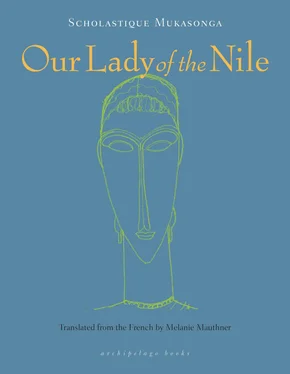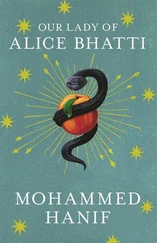“And you’re the one he’s giving to the King of the Belgians? At your age! A big fatty like you! With your kind of grades! Can you see yourself as Fabiola’s daughter?!”
“No, not me, he’s giving one of his own daughters, Merciana, the youngest. She’s nine and very light skinned, looks like her mother. She could almost pass for a white girl.”
“So where does that leave you, then?”
“Me, I’m accompanying Merciana to Belgium. She needs someone to speak Kinyarwanda with so she’s not too homesick, someone to cook her bananas or cassava when she gets a craving.”
“Ah! You’ll be her servant! Now it makes sense!”
“You all claim to be intelligent, but you know nothing. Every queen, every princess has her retainers, even in Rwanda in the olden days. They choose daughters of good families, of noble birth. They’re called ladies-in-waiting. And it’s a great honor to be a queen or princess’s lady-in-waiting.”
“But why did the President choose you?”
“My father keeps out of politics. He’s a banker, as you all know. He’s rich. He knows the President from way back. They were together at the Legion of Mary. He’s trusted. The President told him: ‘I feel reassured that one of your daughters, educated in Rwanda’s best lycée, will be there to look out for my little Merciana. I’m doing this for Rwanda. By giving up my child, I’m saving Rwanda from poverty: the whites will be obliged to help us in return. We’ll be a part of their family. It’s more than a blood pact. Merciana will have two fathers, myself and King Baudouin, both of us linked by this shared child.’ So my father didn’t hesitate: I was chosen to accompany the President’s daughter. After all, I was born in Belgium, and even if I can’t remember it much, maybe I’m still a bit Belgian, so that’s handy for adapting. Now leave me be, I’ve got to finish my packing.”
The whole class immediately gathered in the library to discuss Godelive’s revelations. So that no one might eavesdrop on the debate, they decided to discreetly lock themselves in the archives room. Goretti started off by saying that she didn’t believe a word of what Godelive had said, that she was spinning tales. If the President was really giving up his child, how could he have chosen the ugliest and stupidest girl in the lycée to accompany her? Unless her father had paid for it or had made who knows what kind of promise. Gloriosa couldn’t contain her indignation:
“You’re insulting our President again. Things could end badly for you. Godelive said it, he’s giving away his daughter to save our country. Merciana might not become queen, but she’ll be a princess in Belgium. They’ll marry her to a prince. The Belgians will be obliged to help us. How shameful it would be for them if the country of one of their princesses remained so poor. And Godelive is a true Rwandan, make no mistake, you can’t measure that with grades, even less with beauty. She’ll make a fine representative of the majority people.”
“But if Fabiola’s infertile,” said Modesta, “why doesn’t Baudouin take another wife? Kings can do that, because they absolutely must produce a successor.”
“Baudouin’s a very devout Catholic, he can’t get divorced.”
“One can always sort it out with the Pope. It’s possible for kings. They’re not ordinary folk. They pay, give kickbacks, and the Pope ends up annulling the marriage.”
“Listen,” Immaculée said, “I’ve going to tell you something: it’s not Fabiola who’s sterile, it’s Baudouin who’s impotent.”
“Oh! And how would you know! Shame on you! If your mother could hear you!”
“I overheard my father say so. He often tells his friends. I heard him tell them when I was serving the Primus in the living room. How they laughed! My father was in Kinshasa the day Congo became independent — it was still Léopoldville back then. I don’t know if he saw it all or just heard the story, but here’s what he said.
“King Baudouin arrived from the airport. He was standing in an open-top car, a huge American one like you see in the movies. So Baudouin was standing up, very tall and straight, not moving, like a statue. He was wearing a fine uniform, all white with a large kepi, and at his side was a saber, with gold trim, the King’s saber. Kasavubu looked tiny. There were huge crowds on the boulevard and tons of police. Whites. Then someone stepped out of the crowd. It was a young, well-dressed man, wearing a suit and tie. He’d managed to get through the police lines, no one knows how, and was running after the King’s car, which was driving really slowly. And, bam! All of a sudden, he snatched the saber; he stole the King’s saber and brandished it above his head with both hands, so everyone could see he’d grabbed the saber belonging to the King of the Belgians. The car kept on driving. The King was still standing, motionless, not moving, as if nothing had happened, as if he hadn’t noticed anything. It was like he was under a spell. Soon after, they caught a man with the King’s saber. But everyone said it wasn’t him who’d stolen it. The real thief was Mahungu, not a person, a spirit, an umuzimu , a demon, as Mother Superior would say. But whether Mahungu was a man, a spirit, or someone possessed by Mahungu’s spirit, he was a great wizard, he poisoned the King’s saber, he put some dawa on it. The saber was returned to Baudouin, and Baudouin became impotent. They tried everything to cure him. He consulted all the doctors in Europe and America, but the dawa were stronger. The white doctors couldn’t do a thing. They even brought witch doctors to Brussels, from Buha in Tanzania, but I think my father was exaggerating. What’s certain is that Baudouin will never have children. There, that’s my father’s story.”
The whole class nodded approvingly at Immaculée’s tale. Goretti summarized the general feeling:
“Yes, one must always be wary. There are always poisoners looking to make you sterile. I know some. Don’t get too close to Fabiola, she must be poisoned too, and it could be contagious.”
Over the next few days, the question was whether a presidential car would come to fetch Godelive or whether she would leave with the Queen following her visit. Godelive stopped speaking to anyone and gave a haughty smile to anyone who addressed her. Goretti remained convinced it was all nothing but boasting and lies. Gloriosa hadn’t received any instructions from the Party, so she maintained a cautious reserve while noting that for the sake of Rwanda’s best interests, they could have chosen someone more “political” to advise the rather young Merciana. Godelive would only allow Immaculée to visit her “room.” Immaculée was considered throughout the lycée to be the arbiter of elegance, and was renowned for her knowledge of white women’s beauty secrets.
According to what she told the rest of the class, Godelive asked her about makeup and hairstyles: she had noticed Madame de Decker’s red nails and wanted to know all about nail polish and what was best for toenails and wasn’t there also a polish for lips? And perfume, not the amarachi you could buy from the Pakistani’s, but the real thing, the kind the white girls sprayed all over themselves, that came from Paris, what was it called? But above all: the skin-lightening products that were bound to be more effective than the tubes of Venus de Milo on sale at the market. In the magazines Monsieur Legrand had given them, she’d seen black women, American no doubt, who were almost white and had long, smooth, glossy black hair, and there were even some — Godelive wondered how — who’d gone blond.
Godelive was very worried. What would she look like among all these women who were white, blond, and perfumed? Immaculée’s tales had the class in stitches, but two days before the Queen’s visit, a huge black car arrived quite discreetly at dawn to collect Godelive. The lycée girls rushed in their nighties to look but only glimpsed the Mercedes driving out of the gates, with Godelive waving grandly through the rear window. Some said she was bidding them farewell, others that it was just to taunt them.
Читать дальше












